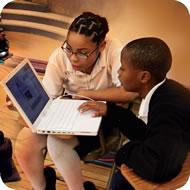A major research study this week described the complex experiences of today's youth with digital media. Fourteen I School students, faculty, and alumni collaborated on the project, which was co-led by the late I School professor Peter Lyman until his death in 2007.
The digital world is creating new opportunities for youth to grapple with social norms, explore interests, develop technical skills, and experiment with new forms of self-expression.
These activities have captured teens’ attention because they provide avenues for extending social worlds, self-directed learning, and independence.
"Kids' Informal Learning with Digital Media: An Ethnographic Investigation of Innovative Knowledge Cultures" was a three-year collaborative project funded by the John D. and Catherine T. MacArthur Foundation. Carried out by researchers at the University of Southern California and University of California, Berkeley, the digital youth project explored how kids use digital media in their everyday lives.
The research project showed that today’s youth may be coming of age and struggling for autonomy and identity amid new worlds for communication, friendship, play, and self-expression.
In addition to the late Professor Lyman, the research team included I School doctoral students Judd Antin, danah boyd, Megan Finn, Mahad Ibrahim, Dilan Mahendran, Dan Perkel, and Christo Sims, and I School alumni Alison Billings (MIMS 2005), Arthur Law (MIMS 2005), Sarai Mitnick (MIMS 2006), Paul Poling (MIMS 2006), David Schlossberg (MIMS 2005), and Sarita Yardi (MIMS 2006).
The full report, entitled Hanging Out, Messing Around, Geeking Out: Living and Learning with New Media, will be published in book form by MIT Press.
Over three years, the
research team interviewed over 800 youth and young adults and
conducted over 5000 hours of online observations as part of the most
extensive U.S. study of youth digital media use to date.
They found that social network sites, online games, video-sharing sites, and gadgets such as iPods and mobile phones are now fixtures of youth culture.
Many adults worry that children are wasting time online, texting, or playing video games. The researchers explain why youth find these activities compelling and important. The digital world is creating new opportunities for youth to grapple with social norms, explore interests, develop technical skills, and experiment with new forms of self-expression. These activities have captured teens’ attention because they provide avenues for extending social worlds, self-directed learning, and independence.
More Information
- Full report:
Ito, Mizuko, Sonja Baumer, Matteo Bittanti, danah boyd, Rachel Cody, Becky Herr, Heather A. Horst, Patricia G. Lange, Dilan Mahendran, Katynka Martinez, C.J. Pascoe, Dan Perkel, Laura Robinson, Christo Sims, and Lisa Tripp. (with Judd Antin, Megan Finn, Arthur Law, Annie Manion, Sarai Mitnick and Dan Schlossberg and Sarita Yardi) Hanging Out, Messing Around, Geeking Out: Living and Learning with New Media. Cambridge: MIT Press, Forthcoming. - Two-page summary of the report (PDF)
- White paper (PDF)
- Press release and video
- Project web page











